Welcome to Himeji! Are you ready to step into a storybook setting? Imagine a city where a majestic castle towers over the streets, a place where history and modernity blend seamlessly. Welcome to Himeji, home to Japan’s most beautiful and well-preserved feudal castle, Himeji Castle, also affectionately known as “White Heron Castle” for its elegant, white facade. But Himeji is more than just its castle. From serene gardens to local culinary delights, this city offers a treasure trove of experiences that await your discovery. Let’s dive into the charm of Himeji and uncover what makes this city a must-visit on your Japanese adventure.
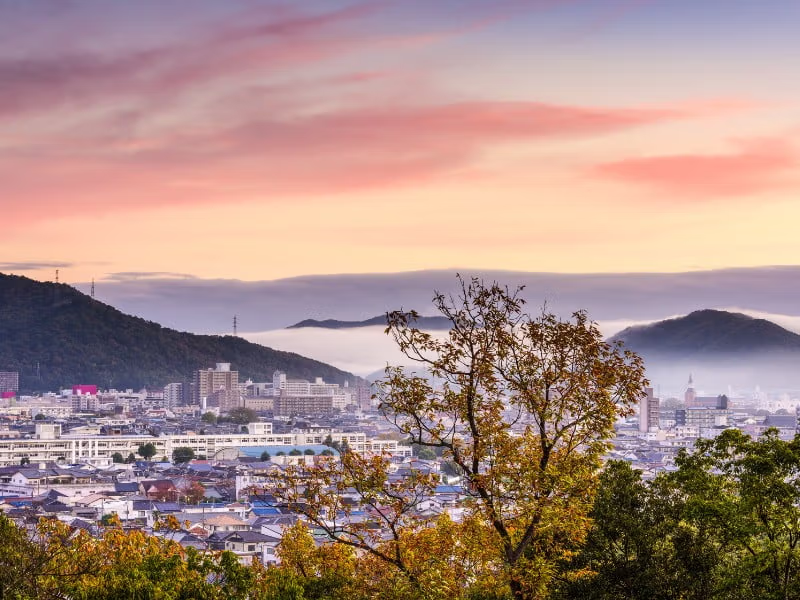
The Crown Jewel: Himeji Castle
A UNESCO Masterpiece: Standing as a testament to the craftsmanship and architectural genius of Japan’s feudal era, Himeji Castle is a sight to behold. Explore its many halls and towers, each telling a story of battles, strategy, and daily life in ancient Japan. The castle’s complex is a maze of beauty, with cherry blossoms in spring and golden hues in autumn framing it perfectly.
Stroll Through History
Gardens and More: After marveling at the castle, take a leisurely stroll to Koko-en Garden, located right next to it. This Edo-period garden features nine separate, beautifully landscaped gardens, each designed to harmonize with the seasons. It’s a place where you can experience the tranquility and aesthetic principles of traditional Japanese gardens.
Culinary Adventures
Flavors of Himeji: Dive into the local cuisine that Himeji has to offer. Be sure to try Himeji’s specialty, “Ika somen” (squid sliced into noodle-like strips), among other local dishes such as “Banshu beef” grilled to perfection. Each meal is an opportunity to savor the unique tastes of the region.
Festivals and Events
Cultural Immersion: Himeji’s calendar is dotted with festivals and events that showcase the city’s rich cultural heritage. The Himeji Castle Cherry Blossom Viewing Festival in spring and the Himeji Yukata Festival in summer are just a couple of occasions when the city comes alive with color, music, and dance.
Beyond the Castle Walls
A City of Discoveries: Venture beyond the castle to uncover Himeji’s other attractions. The historic Shoshazan Engyo-ji Temple, accessible via a scenic ropeway ride, offers panoramic views and a peaceful retreat. Meanwhile, the bustling Miyuki Street is perfect for shopping and sampling street food.
So, grab your camera and your sense of adventure, and let Himeji captivate you with its timeless beauty and charm.
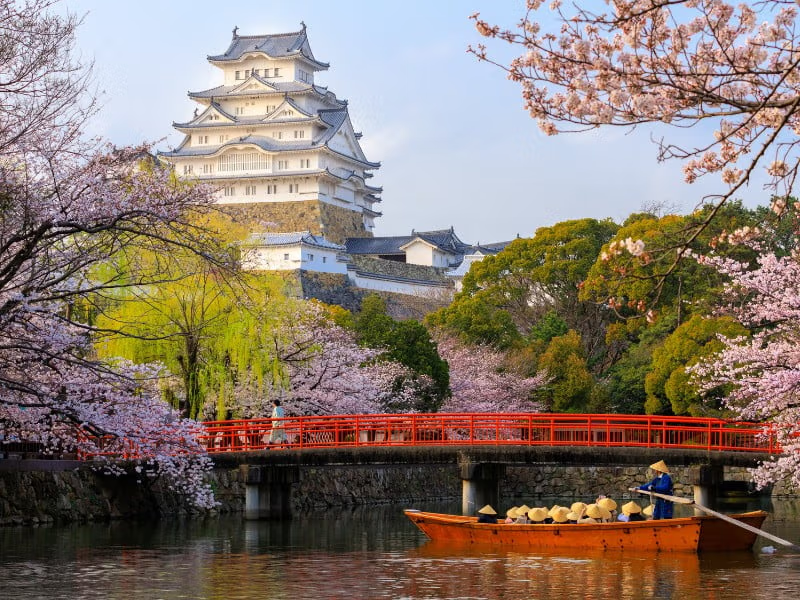
Himeji City Guide: A Brief History Of Himeji, Japan
Ready to time travel? Himeji, with its iconic White Heron Castle (Himeji Castle), is not just a stunning backdrop for photos; it’s a city that has witnessed centuries of history, battles, and cultural transformations. Let’s peel back the layers of time to discover the rich tapestry of Himeji’s past, where samurai roamed, and legends came to life.
The Rise of Himeji Castle
A Fortress in the Sky: Himeji Castle, the heart and soul of the city, began its journey in the 14th century as a small hilltop fort. Through the ages, it evolved into the sprawling complex we see today, thanks to the vision and ambition of various feudal lords. This architectural marvel, surviving wars and natural disasters, stands as a testament to Japan’s ingenuity and the samurai’s enduring spirit.
Feudal Fiefdoms and Samurai Stories
Land of Warriors: Himeji’s strategic location made it a coveted prize among feuding clans during Japan’s tumultuous feudal era. The city saw the rise and fall of powerful samurai families, each leaving their mark on its culture and architecture. The tales of their bravery, strategy, and daily lives are etched into the very stones of Himeji Castle.
A City Built Around Its Castle
Living History: As the castle grew in prominence, the city of Himeji flourished around it. Edo-period streets, merchant houses, and temples sprung up, creating a bustling town centered on the castle’s might. Walking through Himeji today, you can still feel the echoes of the past in its historic streets and buildings.
Transformations Through Time
From Feudal Stronghold to Cultural Icon: Surviving the Meiji Restoration and avoiding the bombings of World War II, Himeji Castle and its city entered the modern era as symbols of resilience and beauty. The castle’s designation as a UNESCO World Heritage site in 1993 cemented Himeji’s place on the global map as a destination of historical and architectural significance.
Preserving the Past
A Commitment to Heritage: Himeji’s dedication to preserving its history is evident not just in the castle but in the efforts to maintain traditional practices, from tea ceremonies to ancient festivals. The city’s museums and cultural centers keep the stories of its past alive for future generations to learn from and enjoy.
Legends Live On
Tales as Old as Time: Beyond the historical facts, Himeji is a land of legends. Stories of ghosts like the famous Okiku well, and tales of hidden treasures add a layer of mystery and intrigue to the city’s historic sites, captivating the imagination of visitors.
So, lace up your walking shoes, and let’s dive deep into the history that shapes Himeji’s present.
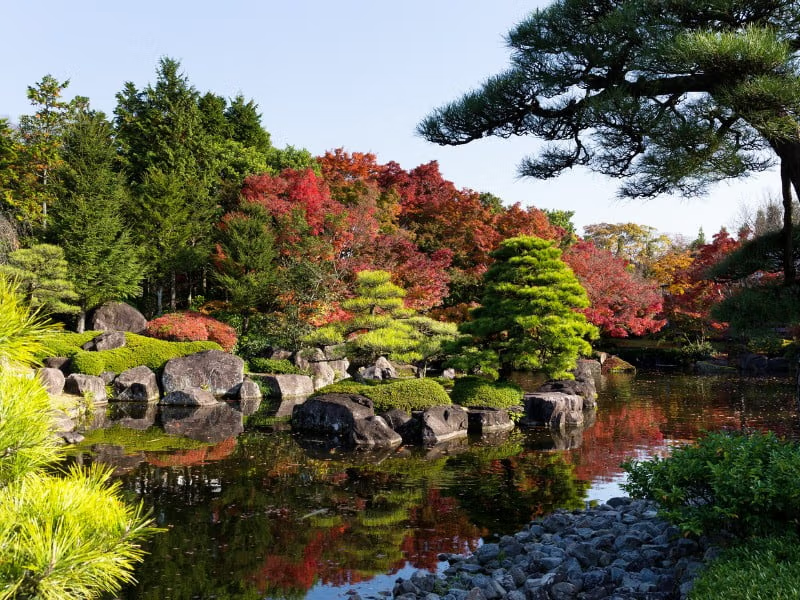
Himeji Top Attractions and Best Places to Visit in Japan
Home to one of the best-known authentic castles in Japan, Himeji is a popular tourist destination for Japanese and foreign tourists alike.
There is more to see than this impressive piece of history, though – with mountains, temples, and offbeat museums, there is enough here to keep you occupied over two full days of sightseeing.
Start your visit to Himeji by checking out Himeji Castle. One of 12 castles in Japan that have survived the Edo Period, the Meiji Restoration, and the Second World War, it is the primary reason why tourists visit this small city in Kansai.
Also known as White Heron Castle for its brilliant white appearance, its imposing presence made it vital to the defence of nearby Kyoto. It consists of 80 buildings connected by ramparts and maze-like paths, the latter of which was designed to confuse attackers.
More Attractions
The top level affords sweeping views of the surrounding area, and in spring, the garden explodes in cherry blossoms, making a popular gathering place for locals. Given the sprawling nature of this attraction, be sure to allow several hours to properly appreciate one of Japan’s most beautiful castles.
Looking to get into nature while in Himeji? Head to the base of Mount Shosha and hike the trail leading up it. Like most urban areas in Japan, Himeji can be a bit of a concrete jungle at times – soon after heading up this path, you’ll be quickly surrounded by greenery that will help you relax and unwind.
The path can be steep in places, so if you aren’t fit, you may need to take your time. Otherwise, there is a ropeway that you can take to get amazing views from the summit without sweating out your body weight in water.
At the top of Mount Shosha, you’ll find a number of Buddhist temples. The most significant of these is Engyoji Temple, as its atmospheric nature led it to be picked for scenes shot in the Hollywood blockbuster, The Last Samurai.
Other Attractions
Engyoji Temple consists of three main buildings: the main hall, a lodging and dining hall where exhibits can now be found, and a gymnasium where monks engage in physical activity. It also boasts panoramic views over the city of Himeji below, so be sure to head up here at Golden Hour for some spectacular photos.
Searching for something interesting and offbeat to see while in the Himeji area? Make your way over to Taiyo Park during your visit. Sitting across from a nursing home, the intent of this place was to give its residents a chance to ‘travel the world’ without leaving home.
While its condition has decayed considerably since its construction many years ago, the presence of global icons like the Great Wall of China, the Terracotta Warriors of Xian, and Germany’s Neuschwanstein Castle give this place a kitsch factor which makes it attractive to many travellers.
Note that admission for this attraction is 1300 yen; if weird, obscure sights aren’t your thing, this might not be for you, especially when you consider its rundown state.
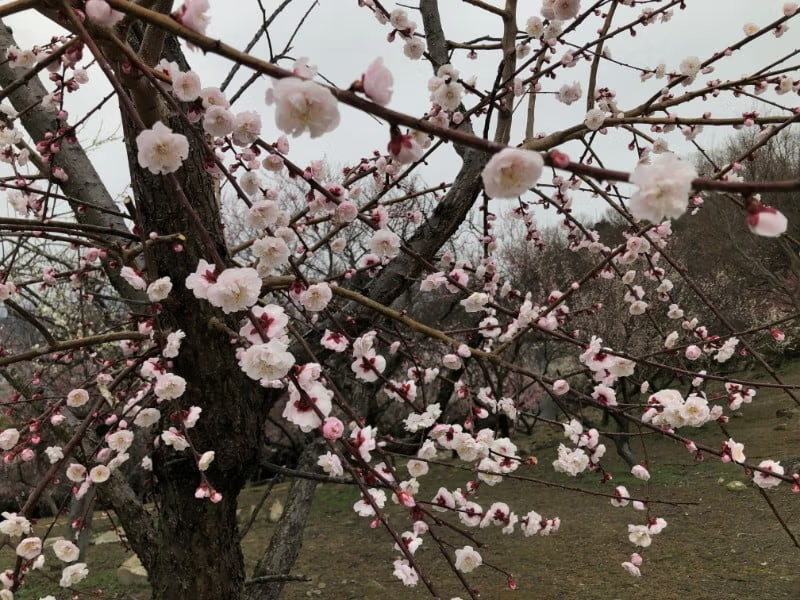
Other Cultural Attractions: Trip to Himeji, Japan
Have a craving for culture during your visit to Himeji? Take an hour or two to explore the Himeji City Museum of Art. Housed inside a building that dates back to the Meiji Restoration, it contains works of art from across Japan and around the world.
Stand out pieces from the likes of Picasso, Rodin, and Delvaux make this place working checking out, even if it doesn’t compare to what can be found in bigger cities.
Take a deep dive into the history of crafts and toys in Japan by visiting the Japan Toy Museum. Located in the countryside ten kilometres from Himeji, you’ll find traditional Japanese folk crafts and toys, as well as examples of toys and crafts from 160 countries around the world.
More Attractions
With 90,000 pieces and with permission to play with many of them, this attraction is a must see for those who remain forever young on the inside.
Located near the grounds of Himeji Castle, Kokoen Garden is a reconstruction of the garden where the lord of the keep once sought solace in nature. Completed in 1992, this serene place is divided into nine separate sections, each representing a style of garden common to the Edo Period.
Before leaving, stop by their tea house and enjoy a cup while you take in this attraction’s peaceful surroundings.
Before boarding the train to go home, grab a meal or drink on Otemae Street. Connecting the train station with Himeji Castle, it is a convenient place to unwind after a day of sightseeing.
source: Happy Trip on YouTube
Top 33 Things To Do in Himeji, Japan For Visitors
Here are the top 33 things to do in Himeji:
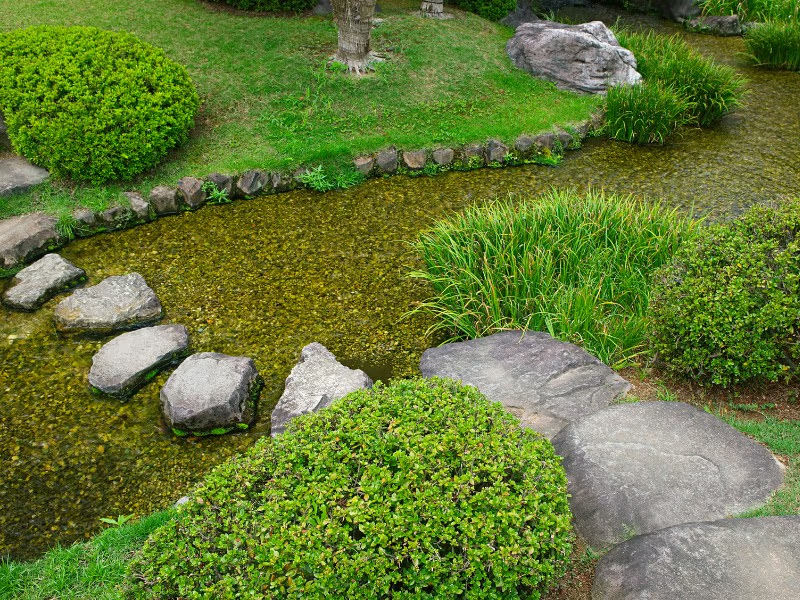
1. Explore Himeji Castle
Himeji Castle, also known as “White Heron Castle” due to its elegant white appearance, is a masterpiece of Japanese feudal architecture. Wander through its numerous defensive features, towers, and gates that have stood the test of time. The panoramic view from the top offers a breathtaking sight of Himeji City and beyond. Visiting during the cherry blossom season adds an extra layer of beauty to this already stunning landmark.
- Historic marvel: One of Japan’s most well-preserved feudal castles.
- Scenic views: Enjoy a panoramic outlook over Himeji City.
- Cherry blossoms: Experience the castle grounds in full bloom.
2. Stroll Through Koko-en Garden
Located next to Himeji Castle, Koko-en Garden is a collection of nine Edo-period walled gardens. Each garden boasts its unique style, featuring traditional Japanese landscaping, tranquil tea houses, and serene water features. It’s a peaceful retreat where you can immerse yourself in traditional Japanese aesthetics. Plus, the garden offers spectacular views of Himeji Castle in the backdrop.
- Nine unique gardens: Explore varied styles within one location.
- Traditional tea houses: Experience a Japanese tea ceremony.
- Photographer’s paradise: Capture stunning views of the castle.
3. Visit Engyo-ji Temple on Mt. Shosha
Perched atop Mt. Shosha, Engyo-ji Temple is a tranquil complex with over 1,000 years of history. Reachable via ropeway, the temple offers hiking trails among ancient buildings set amidst lush forests. Fun fact: it was a filming location for “The Last Samurai.” It’s a serene escape with stunning views that provide a peaceful retreat from city life.
- Historical significance: Over a millennium of history.
- Scenic ropeway ride: Enjoy panoramic vistas on your way up.
- Cinematic location: Explore a site featured in a Hollywood film.
4. Enjoy Himeji Central Park
Himeji Central Park is a unique blend of a safari park, amusement rides, and a water park. Drive through the safari zone to see animals roaming freely, or get your adrenaline pumping on various amusement rides. It’s a fun-filled day out for families and animal enthusiasts alike. Don’t miss the ice-skating rink and snow sledding area for year-round entertainment.
- Safari adventure: Encounter wildlife up close from your vehicle.
- Amusement rides: Thrilling attractions for all ages.
- Year-round fun: Activities like ice-skating available anytime.
5. Learn at the Himeji City Museum of Art
The Himeji City Museum of Art houses an impressive collection of both Japanese and Western art. Exhibitions often focus on themes related to Himeji and its surrounding regions. The building itself, designed by renowned architect Tadao Ando, is a piece of art. It’s a must-visit spot for art aficionados exploring Himeji.
- Diverse collections: Japanese and Western artworks on display.
- Architectural beauty: A Tadao Ando-designed masterpiece.
- Cultural insights: Exhibits highlighting local themes.
6. Walk Through the Hyogo Prefectural Museum of History
Dive into the rich history and culture of Hyōgo Prefecture at the Hyogo Prefectural Museum of History. The museum features interactive exhibits, including reconstructions of historical scenes and artifacts from various eras. Gain insights into the construction and significance of Himeji Castle. It’s an educational journey perfect for history enthusiasts.
- Interactive exhibits: Engaging displays for all ages.
- Historical artifacts: Original items from different periods.
- Castle insights: Learn about Himeji Castle’s past.
7. Relax on the Shoshazan Ropeway
The Shoshazan Ropeway offers a scenic ascent to the top of Mt. Shosha, providing stunning views of Himeji and its surroundings. The ride is especially captivating in autumn when the foliage turns vibrant hues of red and gold. It’s the easiest way to reach Engyo-ji Temple and soak in the area’s natural beauty. At the top station, you’ll find a restaurant and souvenir shop to enhance your visit.
- Panoramic vistas: Breathtaking views during the ride.
- Seasonal beauty: Exceptional in autumn foliage.
- Convenient access: Quick route to Engyo-ji Temple.
8. Visit the Himeji City Aquarium
One of the oldest in Japan, the Himeji City Aquarium offers an intimate look at marine life, focusing on species from the Seto Inland Sea. Explore a variety of fish, crustaceans, and mollusks in well-designed tanks. It’s a fantastic place to learn about marine biodiversity and conservation efforts. The touch pool is a hit with kids, offering a hands-on learning experience.
- Marine diversity: Discover local sea life species.
- Educational exhibits: Learn about ocean conservation.
- Family-friendly: Interactive touch pools for children.
9. Experience the Himeji Yukata Festival
Held in early summer, the Himeji Yukata Festival is one of Japan’s largest celebrations of the traditional summer garment, the yukata. The city buzzes with people wearing colorful yukatas, enjoying food stalls and traditional games. Fireworks light up the night sky, adding magic to the festive atmosphere. It’s a vibrant cultural experience showcasing Japanese summer traditions.
- Cultural immersion: Participate in a traditional Japanese festival.
- Festive activities: Enjoy games, food, and performances.
- Spectacular fireworks: Nightly displays illuminate the sky.
10. Indulge in Himeji Cuisine
Himeji is a food lover’s paradise, known for dishes like Himeji oden (a type of hot pot) and Himeji-yaki (local grilled chicken). Seafood from the nearby Seto Inland Sea is fresh and flavorful. Many restaurants near Himeji Castle offer traditional Japanese meals. Don’t miss out on trying sake from local breweries—it’s the perfect complement to your meal.
- Local specialties: Taste authentic Himeji dishes.
- Fresh seafood: Enjoy catches from the Seto Inland Sea.
- Sake tasting: Sample brews from regional distilleries.
11. Shop at Miyuki Street
Miyuki Street is Himeji’s main shopping artery, lined with a variety of stores selling clothes, accessories, and local specialties. The lively atmosphere is enhanced by numerous cafés and restaurants where you can take a breather. It’s the perfect place to find souvenirs like Himeji leather crafts. In the evening, the street dazzles with beautiful illuminations.
- Retail therapy: Shop for fashion and unique gifts.
- Culinary stops: Enjoy snacks and meals at local eateries.
- Evening charm: Experience the street’s illuminated beauty.
12. See the Otokoyama Hachimangu Shrine
Known for its stunning cherry blossoms in spring, Otokoyama Hachimangu Shrine offers panoramic views of Himeji. The shrine hosts several festivals throughout the year, including a famous archery event. It’s a peaceful spot for a leisurely stroll and provides insight into Japanese religious practices. The climb to the shrine is steep but rewarding.
- Scenic beauty: Ideal for cherry blossom viewing.
- Cultural events: Witness traditional archery festivals.
- Panoramic views: Enjoy vistas of the city from above.
13. Explore Tegarayama Central Park
Tegarayama Central Park is a multifaceted space featuring botanical gardens, an amusement park, and sports facilities. The Tegarayama Botanical Garden includes a greenhouse with tropical and subtropical plants. It’s a delightful place for families to enjoy outdoor activities and relax in nature. Plus, the park offers great views of Himeji Castle in the distance.
- Family fun: Activities for kids and adults alike.
- Botanical wonders: Explore diverse plant species.
- Great vistas: Capture photos of the castle from afar.
14. Visit the Japan Toy Museum
Housed in a beautifully renovated school building, the Japan Toy Museum boasts an extensive collection of traditional Japanese toys. The museum offers insights into the cultural significance of toys and play in Japan. Interactive exhibits let visitors try out various traditional games. It’s a fascinating visit for both children and adults, highlighting craftsmanship and creativity.
- Cultural heritage: Discover traditional Japanese toys.
- Interactive fun: Engage with hands-on exhibits.
- Educational experience: Learn about play’s role in culture.
15. Discover Taiyo Park
Taiyo Park is a unique theme park featuring full-size replicas of famous world landmarks, including the Great Wall of China and the Pyramids of Giza. The park aims to provide an educational experience through its displays and exhibits. It’s an intriguing place for a leisurely walk, offering countless photo opportunities with iconic structures. Don’t miss the museum dedicated to the Meiji Restoration.
- Global landmarks: See world wonders in one place.
- Educational outing: Learn about global cultures.
- Photo spots: Capture fun and unique images.
16. Enjoy the View from Himeji City Tower
The Himeji City Tower offers a panoramic view of the city, including a stunning sight of Himeji Castle and the surrounding landscape. The observation deck is a prime spot to appreciate the city’s layout and natural beauty. It’s especially captivating at sunset and during the cherry blossom season. Located within a modern shopping and entertainment complex, it’s convenient to include in your itinerary.
- Bird’s-eye view: Get a comprehensive look at Himeji.
- Sunset scenes: Ideal for evening photography.
- Convenient location: Access shops and entertainment nearby.
17. Participate in a Tea Ceremony at Soju-an
Experience the art of the Japanese tea ceremony at Soju-an, a traditional tea house near Himeji Castle. The serene setting provides the perfect backdrop to learn about matcha preparation and etiquette. The experience includes wearing a kimono, adding authenticity to your cultural immersion. It’s a peaceful and enlightening activity that connects you with Japanese traditions.
- Cultural immersion: Learn tea ceremony rituals.
- Traditional attire: Wear a kimono during the experience.
- Serene environment: Enjoy tranquility in a historic setting.
18. Walk Through Senhime Peony Garden
Named after Princess Sen, a historical figure linked to Himeji Castle, the Senhime Peony Garden features a stunning collection of peonies. Blooms vary with the seasons, offering a colorful display year-round. It’s a beautiful and tranquil spot for flower enthusiasts. The garden’s design reflects traditional Japanese aesthetics, making it a peaceful retreat.
- Floral beauty: Admire a variety of peony species.
- Seasonal colors: Experience different blooms throughout the year.
- Tranquil setting: Perfect for relaxation and contemplation.
19. Explore the History of Himeji at the Himeji City Museum
Dedicated to the city’s rich history, the Himeji City Museum features artifacts, photographs, and exhibits that tell Himeji’s story. Housed in a historic building, the museum exudes ambiance and charm. It offers a deeper understanding of Himeji’s development over the centuries. Special exhibitions focus on various aspects of local history and culture.
- Historical artifacts: See items from different eras.
- Educational displays: Learn about the city’s evolution.
- Cultural insights: Gain a broader perspective of Himeji.
20. Attend the Himeji Castle Cherry Blossom Viewing Festival
The Cherry Blossom Viewing Festival at Himeji Castle is one of Japan’s most picturesque events. With thousands of cherry trees in full bloom surrounding the castle, it creates a breathtaking backdrop for festivities. Enjoy traditional music, dance performances, and food stalls under the blossoms. It’s a quintessential Japanese spring experience you won’t forget.
- Festive atmosphere: Celebrate under cherry blossoms.
- Cultural performances: Enjoy music and dance shows.
- Gourmet delights: Taste seasonal festival foods.
21. Climb Mt. Shosha for Engyo-ji Temple
Home to the serene Engyo-ji Temple, Mt. Shosha offers both spiritual and physical enrichment. Reach the temple via ropeway or opt for the hiking trails if you’re feeling adventurous. The ancient buildings and statues nestled among the trees create a peaceful retreat. The area gained international fame as a filming location for “The Last Samurai.”
- Spiritual journey: Visit a historic temple complex.
- Nature hike: Trek through lush forests.
- Film location: Explore sites from a famous movie.
22. Experience Himeji’s Nightlife at Sannomaru Square
For a taste of modern Himeji, head to Sannomaru Square to experience the city’s nightlife. The area is packed with bars, restaurants, and izakayas where you can enjoy local food and drinks. It’s a lively spot to meet locals and fellow travelers. Often hosting events and festivals, the square buzzes with energy well into the night.
- Dining options: Savor local cuisine and sake.
- Social scene: Engage with friendly locals.
- Evening entertainment: Enjoy live music and events.
23. Visit the Himeji Literature Museum
Celebrate the literary heritage of Himeji at the Himeji Literature Museum. The museum features exhibits on local authors and poets, showcasing their works and contributions to Japanese literature. Housed in a modern building with library and reading spaces, it’s a haven for book lovers. The museum also hosts literary events, workshops, and talks.
- Literary exhibits: Discover works of regional writers.
- Quiet spaces: Enjoy reading areas within the museum.
- Cultural events: Participate in workshops and lectures.
24. Take a Day Trip to Shoshazan Engyo-ji Temple
Make the most of your visit by spending a full day at Shoshazan Engyo-ji Temple. The complex includes impressive structures, meditation halls, and offers stunning views of the landscape. It’s an ideal blend of cultural exploration and outdoor activity. The tranquil atmosphere is perfect for meditation and reflection away from the city’s hustle and bustle.
- Full-day excursion: Immerse yourself in temple life.
- Meditation spots: Find peace in serene surroundings.
- Architectural beauty: Admire historical buildings.
25. Enjoy Seasonal Flowers at Himeji Arboretum
Known for its collection of seasonal flowers, trees, and plants, the Himeji Arboretum is a botanical delight. Wander through themed gardens, greenhouses, and beautifully landscaped areas. It’s a lovely place for nature walks, photography, and learning about diverse plant species. The arboretum shines during cherry blossom and autumn foliage seasons.
- Botanical variety: Explore a wide range of flora.
- Seasonal highlights: Visit during peak bloom times.
- Educational trails: Learn about plant conservation.
26. Visit Igidani Gorge for Autumn Colors
Igidani Gorge is a scenic marvel known for its spectacular autumn colors. Hike along trails that offer views of waterfalls, rock formations, and vibrant foliage. It’s a haven for nature lovers and photographers during the fall season. The gorge showcases Himeji’s diverse and breathtaking landscapes.
- Autumn spectacle: Witness stunning fall foliage.
- Natural wonders: See waterfalls and unique rocks.
- Hiking adventure: Enjoy trails suitable for various levels.
27. Explore the Himeji City Zoo
Located near Himeji Castle, the Himeji City Zoo is a family-friendly attraction housing a variety of animals, including species native to Japan. It’s an educational place where children can learn about animal conservation and biodiversity. The zoo also features a petting area and interactive programs.
- Animal encounters: See diverse wildlife up close.
- Educational programs: Participate in conservation talks.
- Family fun: Enjoy activities suitable for all ages.
28. Admire the Architecture of Himeji Art Museum
Notable for its striking modern architecture, the Himeji Art Museum showcases contemporary art from Japan and around the world. The building’s design complements the artworks, creating a harmonious environment for appreciation. Its proximity to Himeji Castle offers a fascinating contrast between the historic and the modern.
- Contemporary collections: View modern artistic expressions.
- Architectural elegance: Appreciate the museum’s design.
- Cultural contrast: Experience old and new Himeji side by side.
29. Experience the Himeji Yukata Festival
Yes, it’s so fantastic it’s worth mentioning twice! The Himeji Yukata Festival is one of the largest celebrations of its kind in Japan. Enjoy parades, dance performances, and a vibrant night market brimming with local delicacies. It’s a colorful and lively event that immerses you in Japanese culture and fashion. Wearing a yukata yourself enhances the experience.
- Fashion showcase: See a variety of yukata styles.
- Community vibe: Join locals in festive activities.
- Night market: Explore stalls offering food and crafts.
30. Visit Otokoyama Hachiman Shrine
Another must-visit shrine is the Otokoyama Hachiman Shrine, known for its seasonal beauty with cherry blossoms and autumn foliage. The shrine hosts several festivals, making it a vibrant place year-round. It’s a peaceful spot offering insights into Shinto practices and beliefs. The hilltop location provides sweeping views of Himeji.
- Spiritual site: Experience traditional Shinto rituals.
- Festive atmosphere: Attend local festivals and events.
- Scenic overlook: Take in panoramic city views.
31. Take a Cooking Class in Himeji Cuisine
Dive into the culinary world by taking a cooking class focused on Himeji’s local specialties like Himeji oden and sushi. It’s a hands-on way to engage with Japanese culture and traditions. Enjoy the fruits of your labor by savoring the dishes you’ve prepared. Classes cater to various skill levels, so everyone is welcome.
- Hands-on learning: Cook authentic Japanese dishes.
- Culinary skills: Gain techniques to use at home.
- Cultural connection: Understand the significance of local foods.
32. Explore the Himeji Port Marine Terminal
The Himeji Port Marine Terminal is a modern facility offering recreational activities, dining, and shopping. Enjoy boat tours around the port for unique views of Himeji Castle from the sea. The terminal’s sleek design is an attraction in itself. Spend an evening here to enjoy fresh seafood while watching the sunset over the port.
- Sea excursions: Take boat tours with scenic views.
- Gourmet dining: Feast on fresh, local seafood.
- Modern architecture: Admire the terminal’s design.
33. Attend the Himeji Castle Noh Performance
Experience traditional Japanese performing arts by attending a Noh theatre performance at Himeji Castle. Noh is a classical musical drama known for its elaborate costumes and masks. Watching a performance in the historic setting of the castle is truly memorable. It’s a rare opportunity to witness one of Japan’s oldest art forms in an authentic environment.
- Cultural immersion: Discover classical Japanese theatre.
- Historic ambiance: Enjoy the performance at the castle.
- Artistic expression: Appreciate intricate costumes and storytelling.
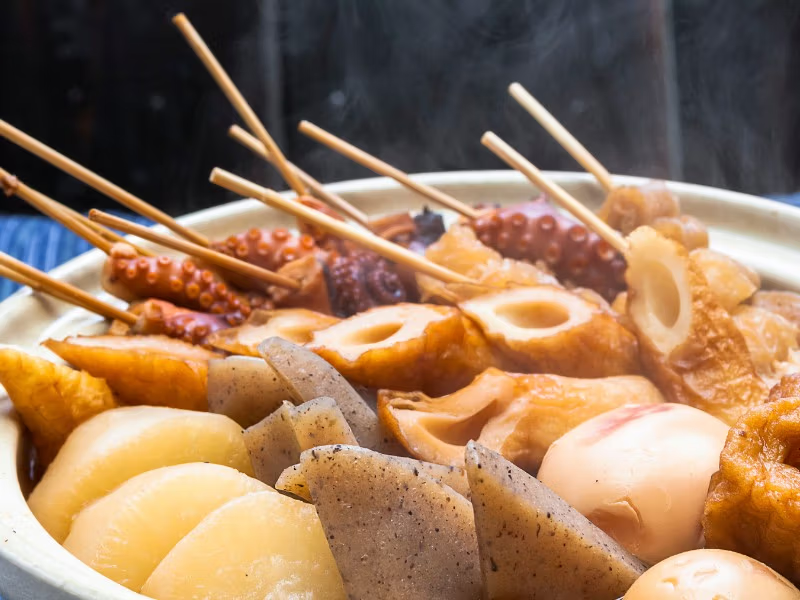
What To Eat and Drink in Himeji, Japan
Here’s your travel guide to the must-try foods and drinks in Himeji, ensuring every meal enriches your journey through this historic city.
Himeji’s Culinary Highlights
1. Himeji Oden: A comfort food staple, Himeji’s version of the classic Japanese hot pot features a rich, soy-flavored broth and an assortment of ingredients like daikon radish, konnyaku, and boiled eggs. It’s a heartwarming dish, perfect for chilly evenings.
2. Conger Eel: Thanks to its proximity to the Seto Inland Sea, Himeji enjoys access to fresh seafood, with conger eel being a local favorite. Grilled and glazed with a sweet and savory sauce, it’s often served over rice as unadon.
3. Ikanago no Kugini: This traditional springtime delicacy involves tiny sand lance fish cooked in a sweet and salty mixture of soy sauce, sugar, and ginger. Ikanago no kugini is enjoyed as a side dish or a topping on rice.
4. Himeji Yakisoba: While yakisoba (fried noodles) is popular nationwide, Himeji puts its twist on this classic by using a special sauce and topping the noodles with a generous sprinkle of aonori (green seaweed powder) and beni shoga (pickled ginger).
Sweet Treats
5. Himeji Castle-shaped Sweets: Several local confectioneries create beautiful, castle-shaped sweets that not only taste delicious but also make for perfect souvenirs. These treats, often made from white bean paste, celebrate the city’s most famous landmark.
6. Matcha Delights: The Kansai region’s tea culture shines in Himeji through an array of matcha-infused sweets. From matcha ice cream to traditional wagashi (Japanese sweets) enjoyed during tea ceremonies, the rich, umami flavor of matcha is a highlight.
Local Beverages
7. Sake: Himeji’s breweries produce some exquisite sake, thanks to the high-quality rice and pure water of the region. Visiting a local brewery for a tasting session is a great way to experience the depth and variety of Japanese rice wine.
8. Harima Wines: The broader Harima area, which includes Himeji, is gaining recognition for its wines. Local wineries utilize grapes like muscat bailey A and chardonnay to create wines that are starting to make a mark on the international stage.
Casual Eats and Street Food
9. Butaman: These steamed buns filled with juicy pork and vegetables are a popular snack in Himeji. Available at street stalls and specialty shops, they’re perfect for a quick bite while exploring the city.
10. Tako Tamago: A quirky and beloved street food item, tako tamago is a small octopus with a quail egg in its head. It’s often served on a skewer and offers a unique taste experience that combines seafood and egg flavors.
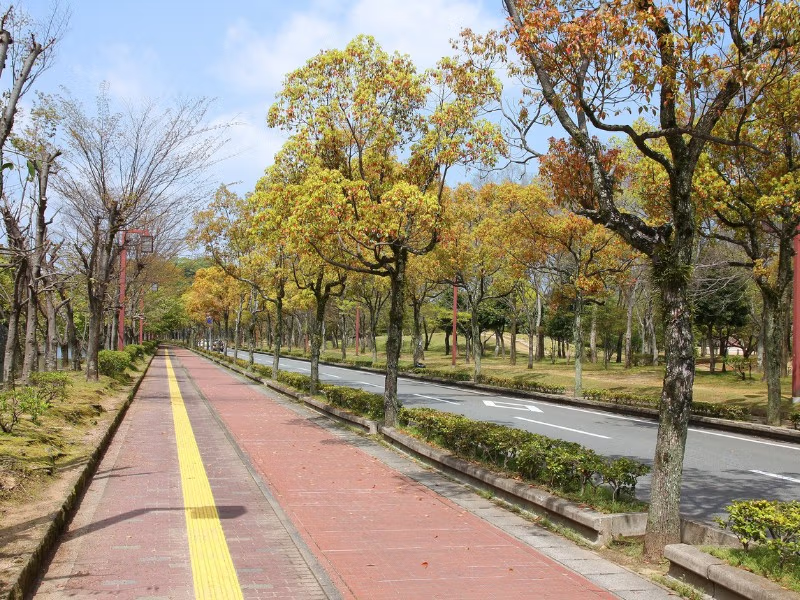
Tours For Visitors To Himeji, Japan
Here’s a comprehensive list of tours designed to help you discover the best of Himeji, ensuring a memorable and engaging experience in this storied Japanese city.
1. Himeji Castle Guided Tours
Dive deep into the history of Japan’s most exquisite feudal castle with a guided tour. Experts share fascinating stories of samurai bravery, architectural ingenuity, and the castle’s survival through the ages. The tour often includes visits to the Nishi-Oyashiki-Ato Garden and Kokoen Garden, providing a fuller picture of the castle’s historical context.
2. Koko-en Garden Walks
Experience the tranquility and beauty of traditional Japanese gardens with a guided walk through Koko-en, located adjacent to Himeji Castle. This tour highlights the design principles of Japanese gardens and the significance of each of the nine separately themed gardens within Koko-en, offering insights into Edo-period landscaping aesthetics.
3. Himeji Culinary Tours
Indulge in Himeji’s rich culinary scene with a tour focused on local cuisine. Sample regional specialties like Himeji oden, grilled conger eel, and the unique Ikanago no Kugini. These tours often include visits to local markets and hidden gem eateries, providing a taste of Himeji’s food culture.
4. Engyo-ji Temple Excursions
Venture to the serene Engyo-ji Temple on Mount Shosha, a site famous for its appearance in the film “The Last Samurai.” This tour typically involves a cable car ride up the mountain, followed by a guided exploration of the temple’s expansive grounds, ancient structures, and breathtaking views of the surrounding area.
5. Cycling Tours around Himeji
Explore Himeji’s picturesque landscapes and lesser-known attractions on a cycling tour. These tours offer a refreshing way to see the city and its outskirts, including lush rice fields, local neighborhoods, and scenic spots along the Seto Inland Sea, with routes tailored for various fitness levels.
6. Himeji Brewery and Sake Tasting Tours
Discover the delicate art of sake brewing with a visit to one of Himeji’s local breweries. Learn about the sake-making process, from rice selection to fermentation, and enjoy a tasting session that showcases the unique flavors of Japanese rice wine.
7. Traditional Crafts Workshops
Engage in hands-on experiences with workshops dedicated to traditional Japanese crafts. Options in Himeji might include pottery making, calligraphy, or indigo dyeing, offering a deeper connection to Japan’s artisanal heritage and the chance to create your own souvenir.
8. Himeji Night Tours
Experience a different side of Himeji with a guided night tour. Explore the illuminated city streets, visit popular local hangouts, and enjoy the magical view of Himeji Castle lit up against the night sky, providing a memorable end to your day.
9. Historical Walks through Himeji’s Samurai District
Take a step back in time with a guided walk through Himeji’s well-preserved samurai district. Learn about the daily lives of samurai families, the architecture of their residences, and the enduring legacy of Japan’s warrior class.
10. Seasonal Festival Tours
Immerse yourself in local culture by participating in a tour centered around Himeji’s seasonal festivals. Whether it’s the cherry blossom viewing in spring or the autumn festival, these tours offer a unique opportunity to celebrate with locals and experience traditional festivities.
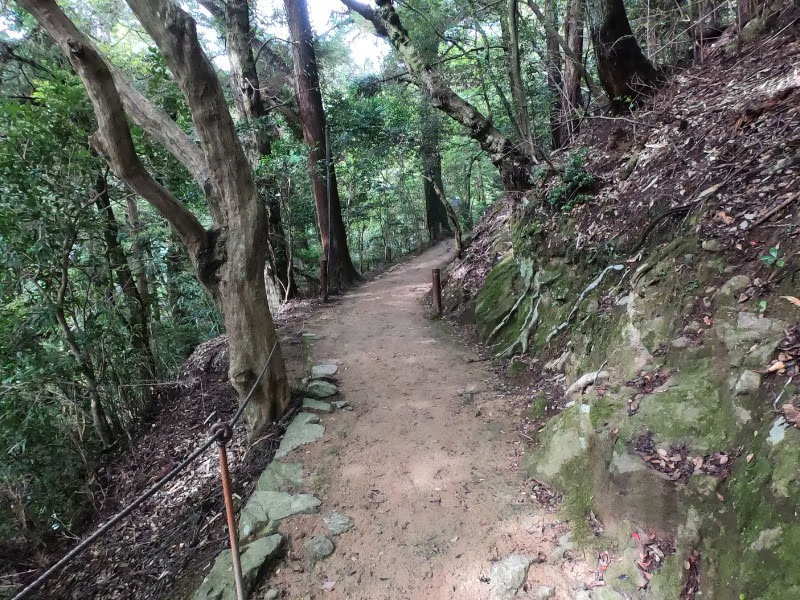
Himeji Accommodations Guide: Hotels, Guesthouses and Hostels
Here’s our travel guide to some of the best accommodations in Himeji, catering to a range of preferences and budgets.
Luxury Hotels
1. Hotel Nikko Himeji: Situated conveniently across from Himeji Station, this hotel offers easy access to the city’s main attractions. With spacious rooms, multiple dining options, and a fitness center, it provides a comfortable and luxurious stay.
2. Daiwa Roynet Hotel Himeji: A modern hotel located a short walk from the castle, offering contemporary rooms with stunning views of the city and the castle. Its amenities include a restaurant serving local and international cuisine and a well-equipped gym.
Mid-Range Options
3. Comfort Hotel Himeji: Offering a blend of comfort and value, this hotel is just a few minutes from Himeji Station. Guests can enjoy complimentary breakfast, free Wi-Fi, and cozy rooms, making it an excellent base for exploring the city.
4. Himeji Castle Grandvrio Hotel: Located within walking distance to Himeji Castle, this hotel features traditional Japanese-style rooms and Western rooms, catering to various preferences. The on-site onsen is perfect for relaxation after a day of sightseeing.
Budget-Friendly Stays
5. Himeji 588 Guesthouse: A charming guesthouse offering a homey atmosphere with both private rooms and dormitories. It’s an ideal choice for budget travelers and those looking to meet fellow travelers.
6. Engyoji Temple Lodging (Shukubo): For a unique experience, stay at the temple lodgings on Mount Shosha. It offers traditional Japanese accommodation and the opportunity to participate in temple activities, providing a peaceful retreat from the city.
Hostels
7. Himeji Guesthouse Hideout: A cozy and friendly hostel located in the heart of Himeji. It provides dormitory beds and private rooms, a communal kitchen, and a lounge area, making it a favorite among backpackers and solo travelers.
Boutique and Unique Options
8. Hotel Monterey Himeji: This boutique hotel, inspired by European design, stands out for its unique architecture and interior. Located close to the train station, it offers easy access to the city’s attractions and a comfortable stay with a touch of elegance.
Traditional Ryokans
9. Shiori: Experience authentic Japanese hospitality at this ryokan, where you can enjoy traditional tatami rooms, futon bedding, and kaiseki meals prepared with local ingredients. It’s a short drive from Himeji Castle, offering a tranquil escape with a cultural immersion.
Family-Friendly Accommodations
10. APA Hotel Himeji-Ekikita: With its convenient location near Himeji Station and spacious rooms, this hotel is a great option for families. The hotel offers modern amenities and easy access to public transport, making it simple to explore Himeji and its surroundings.
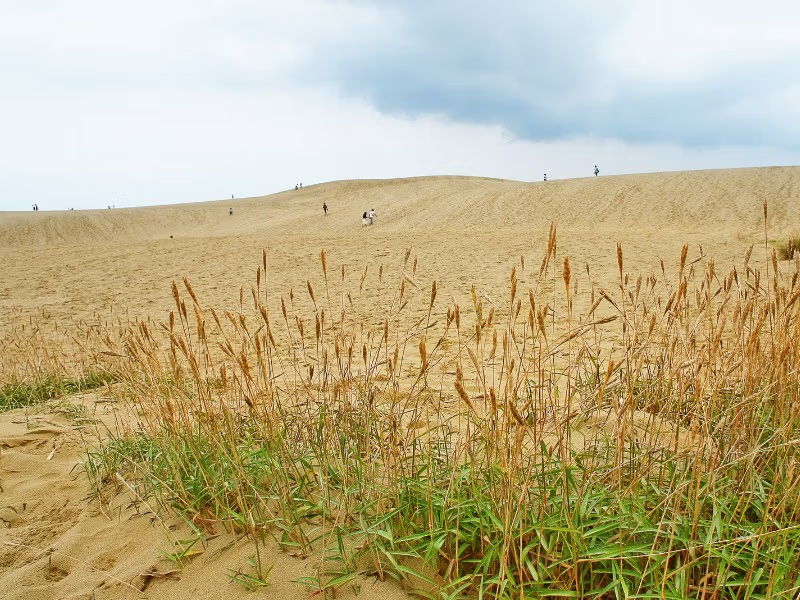
Day Trips From Himeji, Japan
Here’s a selection of day trips from Himeji that showcase the diversity and allure of the Kansai area and beyond.
1. Kobe
Just a short train ride away, Kobe offers a blend of cosmopolitan flair and natural beauty. Visit the Ikuta Shrine, one of Japan’s oldest Shinto shrines, and stroll through the vibrant Chinatown. Don’t miss the panoramic views of the city and Osaka Bay from Kobe’s Nunobiki Herb Garden and Ropeway. Kobe’s renowned beef is a culinary must-try, perfectly grilled in many of the city’s restaurants.
2. Okayama
Known for the beautiful Korakuen Garden, one of Japan’s three great gardens, Okayama is a haven of tranquility. Explore Okayama Castle, also known as “Crow Castle,” for its distinctive black exterior, located just beside the garden. The historic Bikan district in Kurashiki, with its preserved Edo-period streets, is perfect for leisurely strolls. Okayama is also famous for its delicious peaches, a sweet treat not to be missed.
3. Tottori
Famous for the Tottori Sand Dunes, Japan’s largest sand dunes offer a unique landscape that feels worlds away from the usual urban or mountainous scenery of Japan. Enjoy camel rides or sandboarding for an adventurous experience. The Sand Museum nearby displays intricate sand sculptures by artists from around the world. Tottori’s coastline, along the Sea of Japan, provides fresh seafood delicacies, making it a great spot for foodies.
4. Naoshima
Naoshima, the “art island,” is a bit further afield but worth the journey for art and architecture enthusiasts. The island features numerous contemporary art museums, installations, and sculptures, including the iconic yellow pumpkin by Yayoi Kusama. Explore the Benesse House Museum, combining a museum with a hotel, designed by renowned architect Tadao Ando. Naoshima’s tranquil setting and artistic atmosphere provide a peaceful retreat.
5. Kurashiki
Kurashiki’s historic Bikan district, with its beautifully preserved canals and white-walled storehouses, offers a glimpse into Japan’s past. The Ohara Museum of Art, the first museum of Western art in Japan, houses an impressive collection. Enjoy a leisurely boat ride on the Kurashiki Canal to fully appreciate the charm of the area. Local cafes and shops along the canal offer delightful breaks to sample regional snacks and crafts.
6. Takamatsu
Located on Shikoku Island, Takamatsu is accessible by train and ferry and is known for Ritsurin Garden, one of Japan’s most beautiful historical gardens. The city’s waterfront, with its modern art installations and views of the Seto Inland Sea, is perfect for an evening stroll. Takamatsu is also the gateway to the art islands of Naoshima and Teshima. The local specialty, Sanuki udon, is renowned for its chewy texture and delicious broth.
7. Awaji Island
Accessible via the Akashi Kaikyo Bridge, the world’s longest suspension bridge, Awaji Island offers natural beauty and cultural experiences. Visit the Naruto Whirlpools at the island’s northern tip, best viewed from a boat tour or the Uzunomichi Walkway. The Awaji Island Onion Kitchen showcases the island’s famous sweet onions in various dishes. Explore the Awaji Yumebutai, a complex of gardens and architectural marvels designed by Tadao Ando.
8. Ako
Famous for its samurai history and the tale of the 47 Ronin, Ako offers a rich cultural experience. Visit Ako Castle ruins and the Oishi Shrine, dedicated to the leader of the 47 Ronin, to learn more about this famous story of loyalty and revenge. Ako’s Onsen district, with its saltwater hot springs, offers relaxation with a view of the Seto Inland Sea. Don’t leave without trying Ako’s salt, a local specialty used in various Japanese dishes.
9. Mt. Shosha
Just a short bus ride from Himeji, Mt. Shosha is home to the ancient Engyo-ji Temple, a serene mountain temple complex with over 1,000 years of history. The temple grounds and surrounding forest offer peaceful hiking trails. Fans of “The Last Samurai” will recognize the temple as a filming location. The mountain provides stunning views over Himeji and the surrounding countryside.
10. Arima Onsen
One of Japan’s oldest hot spring towns, Arima Onsen offers a relaxing day trip to soak in its famous gold and silver thermal waters. Stroll through the charming town, visit traditional ryokans, and sample local delicacies like Arima manju (sweet buns). The town is nestled in the scenic Rokko Mountain range, offering beautiful views and nature walks. Arima Onsen is a perfect blend of relaxation, nature, and tradition.
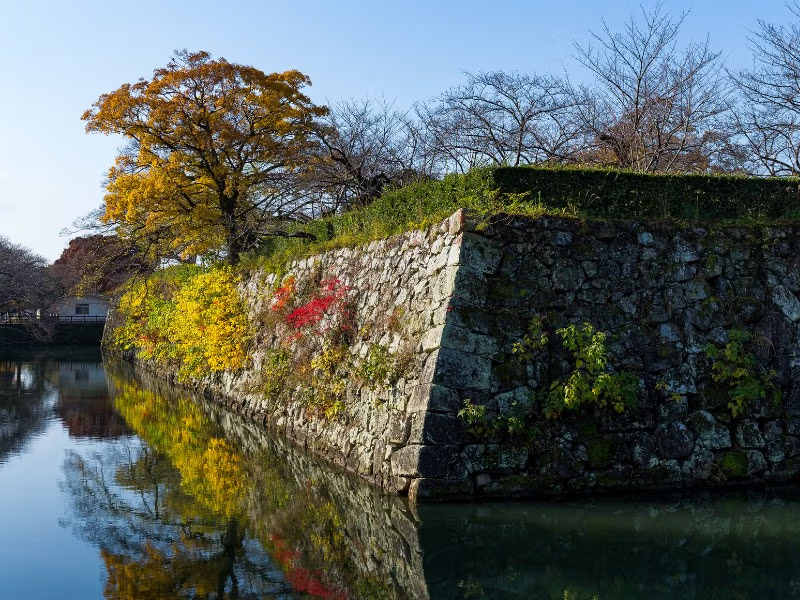
Himeji Transportation Guide
Whether you’re exploring the city’s iconic castle, indulging in local cuisine, or setting off on day trips, understanding your transportation options is key. Here’s a comprehensive guide to getting around Himeji and beyond.
Getting to Himeji
By Train: Himeji is easily accessible by train, including the Shinkansen (bullet train), making it a convenient stop for travelers coming from Tokyo, Kyoto, Osaka, and other major cities. The city’s main hub, Himeji Station, is well-served by both JR (Japan Railways) lines and the Sanyo Shinkansen line.
By Bus: Long-distance buses connect Himeji with various parts of Japan. The bus terminal is located near Himeji Station, offering an affordable alternative to trains, especially for travelers coming from regions not served by the Shinkansen.
Exploring Himeji
On Foot: Himeji’s compact city center is best explored on foot, particularly the area around Himeji Castle and the surrounding gardens. Many of Himeji’s attractions, including shopping streets and local eateries, are within walking distance of the main train station.
By Bicycle: Renting a bicycle is a great way to explore Himeji at your own pace. Bike rental services are available near Himeji Station, allowing you to discover hidden gems and enjoy the city’s scenic beauty with ease.
By Taxi: Taxis are readily available in Himeji and offer a convenient option for direct travel to specific destinations. They can be hailed on the street, found at taxi stands, especially near the train station, or booked in advance.
By Bus: The Himeji City Loop Bus, known as “Shinki Bus,” is an affordable and convenient way to navigate the city. It connects Himeji Station with major attractions, including Himeji Castle and Koko-en Garden. For exploring areas outside the city center, a network of local and regional buses is available.
Day Trips from Himeji
By Train: The JR lines provide efficient connections from Himeji to nearby cities and attractions, including Kobe, Okayama, and Kurashiki. For destinations further afield, like Kyoto and Osaka, the Shinkansen offers quick and comfortable travel.
By Bus: For some destinations not directly served by train or where scenic routes are preferred, intercity buses offer an alternative. Bus services can be particularly useful for visiting natural attractions and hot spring resorts in the region.
By Rental Car: Renting a car gives you the flexibility to explore at your own pace, making it ideal for visiting rural areas, national parks, and attractions that are off the beaten path. Car rental agencies are available in Himeji, and an international driving permit is required for foreign drivers.
Travel Tips
- Japan Rail Pass: For international visitors planning extensive travel by train, the Japan Rail Pass offers unlimited use of JR trains nationwide for a fixed period, including most Shinkansen lines.
- IC Cards: For convenience on public transit within Himeji and across Japan, consider using a rechargeable IC card like ICOCA or SUICA. These cards can be used on buses, trains, and even some taxis, simplifying fares and transfers.
- Stay Informed: Check schedules and routes in advance, especially when planning day trips or travel during peak periods and holidays, to ensure smooth connections and avoid delays.
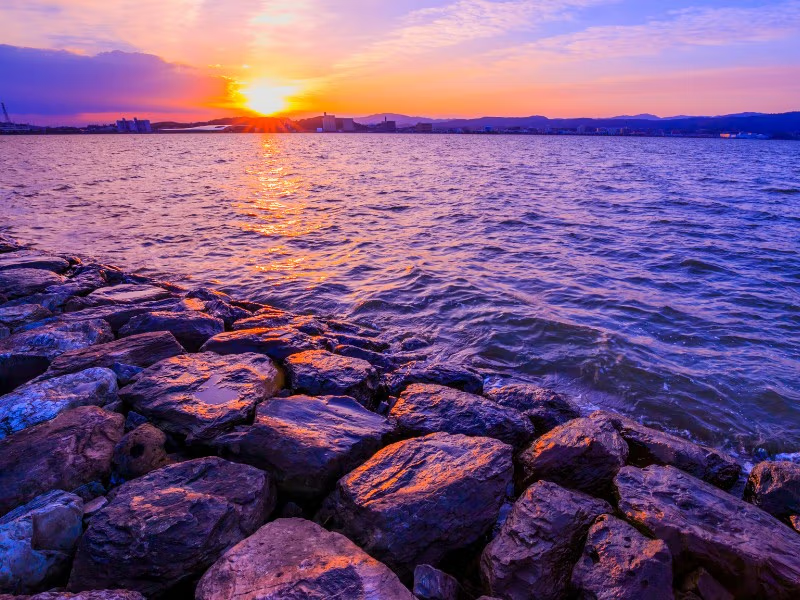
Where To Visit After Your Trip To Himeji?
Here’s a thoughtfully curated list of destinations for your next adventure after Himeji, each offering its own unique blend of attractions and experiences.
1. Kyoto
Just a short train ride from Himeji, Kyoto, the heart of traditional Japan, awaits with its 1,000+ temples, vibrant geisha district in Gion, and tranquil Zen gardens. Don’t miss the iconic Fushimi Inari Shrine and its thousand Torii gates. The historic Arashiyama district, with its famous bamboo grove, offers a picturesque escape. Kyoto’s culinary scene, from street food to Michelin-starred restaurants, showcases the best of Japanese cuisine.
2. Osaka
Known for its dynamic food scene, Osaka entices travelers with street food staples like takoyaki and okonomiyaki. The city’s bustling atmosphere is epitomized in the neon-lit Dotonbori district. Osaka Castle provides a historical counterpoint to the urban energy, set in a sprawling park with plum and cherry blossom trees. The city is also a gateway to Universal Studios Japan, making it a hit with families and pop culture enthusiasts alike.
source: Samuel and Audrey on YouTube
3. Nara
As Japan’s first permanent capital, Nara is steeped in history, with Todai-ji Temple housing the world’s largest bronze Buddha statue. Nara Park is famous for its freely roaming deer, considered messengers of the gods. The lantern-lined paths of Kasuga Taisha Shrine offer a peaceful retreat. Nara’s quaint backstreets and traditional teahouses provide a glimpse into a slower-paced Japan.
4. Kobe
Just a stone’s throw from Himeji, Kobe is a cosmopolitan port city known for its signature marbled beef. The city’s scenic harbor area, Meriken Park, and the vibrant Chinatown are perfect for exploring. Take a cable car up Mount Rokko for breathtaking views of the city and Osaka Bay. The Earthquake Memorial Museum offers a poignant look at the city’s resilience following the 1995 disaster.
5. Hiroshima
Accessible by shinkansen, Hiroshima invites reflection with its Peace Memorial Park and Museum, commemorating the tragic atomic bombing. A short ferry ride takes you to Miyajima Island, where the iconic floating torii gate of Itsukushima Shrine awaits. Hiroshima’s culinary scene is famed for okonomiyaki, a savory pancake you can enjoy at many local eateries. The city serves as a poignant reminder of peace and resilience.
6. Takayama
Nestled in the Japanese Alps, Takayama is known for its well-preserved old town and biannual Takayama Festival. Sample Hida beef, a local delicacy, and explore traditional sake breweries. The nearby Shirakawa-go with its gassho-zukuri farmhouses offers a glimpse into rural Japanese life. Takayama provides a perfect blend of history, culture, and natural beauty.
7. Kanazawa
Kanazawa features beautifully preserved samurai and geisha districts, along with the Kenrokuen Garden, one of Japan’s top three gardens. The 21st Century Museum of Contemporary Art offers a modern contrast with its innovative exhibits. Enjoy fresh seafood from the Sea of Japan at the Omicho Market. Kanazawa’s rich craft heritage, including gold leaf and Kaga yuzen silk dyeing, is on full display in its shops and studios.
8. Okayama
Famed for Korakuen Garden, one of Japan’s most beautiful landscape gardens, Okayama also boasts the imposing black Okayama Castle. The nearby Kurashiki Bikan Historical Quarter, with its scenic canals and traditional storehouses, offers a charming stroll. Okayama is renowned for its fruits, particularly peaches, which can be savored in various local desserts. The city serves as a gateway to the art islands of Naoshima and Teshima.
9. Matsue
Matsue, known as the “City of Water,” is famous for its original feudal castle, one of the few remaining in Japan. The city is crisscrossed by picturesque canals, best enjoyed on a leisurely boat tour. Experience a traditional tea ceremony at the Meimei-an Tea House. Matsue’s location by Lake Shinji makes it a great spot for enjoying sunset views and local Shimane Prefecture seafood.
10. Awaji Island
Linked to the mainland by the Akashi Kaikyo Bridge, Awaji Island offers a mix of natural, culinary, and cultural attractions. Explore the Naruto whirlpools, visit the Awaji Yumebutai gardens, and enjoy onion-based dishes, a local specialty. The island’s puppet theater presents traditional performances. Awaji’s scenic beauty and relaxed pace make it an ideal destination for those looking to unwind.
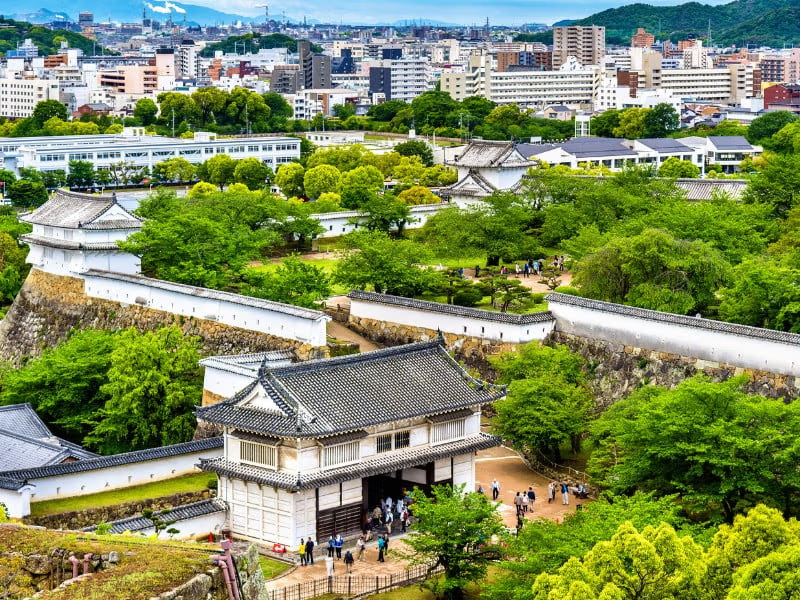
Essential Questions About Visiting Himeji, Japan: Practical Trip-Planning Answers, Castle Tips, Food Ideas & Easy Day-Trip Guidance
How many days do you really need in Himeji for a first visit?
Two days is the sweet spot for most first-timers. Day one is your castle-and-garden day with time to wander the approaches, snack on the way, and not sprint through the keep. Day two is perfect for Mount Shosha and a slower dive into food, shopping streets, and smaller museums.
Could you do it in one day? Absolutely. If you’re basing in Osaka or Kyoto, a well-planned day trip still feels satisfying—just be ready for a fairly castle-heavy schedule.
Is Himeji worth doing as a day trip from Osaka or Kyoto?
Yes. Himeji is one of the easiest “big reward, low effort” day trips in Kansai. The train ride is straightforward, the castle is a genuine icon, and the city layout is friendly for a tight itinerary.
If your Japan schedule is packed, Himeji is one of those places that still feels complete even in a single long day.
What’s the smartest way to time Himeji Castle and Koko-en in one visit?
We like starting early at the castle, then decompressing in Koko-en right after. The contrast is perfect: intense history and steep stairs first, calm ponds and quiet paths second.
If you’re visiting in peak spring or autumn, an early arrival makes a huge difference in both crowd levels and photo opportunities.
Do I need to buy tickets in advance for Himeji Castle?
Not really. For most travelers, same-day tickets are fine. The bigger “hack” is arriving early rather than stressing about advance booking.
If you’re visiting during a major holiday period or peak cherry blossom weekends, you might see longer queues—but it still tends to move.
How much does Himeji Castle cost, and is the combo ticket with Koko-en worth it?
The combo ticket is one of the easiest yeses in Japanese sightseeing. You’re already right there, and Koko-en is legitimately beautiful.
As of current published pricing, Himeji Castle admission for adults is around 1,000 yen, with a modest additional fee for Koko-en—or you can grab a combined ticket that’s only slightly more than the castle alone. There are also announced plans for a significant entrance fee increase for non-Himeji residents starting in March 2026.
Is Koko-en still enjoyable if I’m not a huge garden person?
Absolutely. Koko-en isn’t just “nice landscaping.” It’s a curated set of different garden styles, and the views back toward the castle give you some of the best “quiet Himeji” moments of the whole trip.
Even if you only spend 45–60 minutes there, it adds a calm, elegant finish to your castle visit.
How do you get to Mount Shosha and Engyo-ji, and should I take the ropeway?
It depends. If you love hiking, the walk up is rewarding and gives you that forest-and-temple pilgrimage feel. If you’re short on time or energy, the ropeway is a no-brainer.
A common route is bus from the station area to the ropeway base, then ropeway up, followed by a bit of walking inside the temple complex. Current published fares list the ropeway in the low-thousands of yen for a round trip, with separate admission for Engyo-ji and some bundled discount tickets available.
What’s the best time of year to visit Himeji?
Spring and autumn win on vibes. Cherry blossom season gives you the classic postcard framing of the White Heron Castle, while autumn brings softer light and a more tranquil mood on Mount Shosha.
Summer is hot and humid but fun if you like festivals, evening strolls, and lighter crowds. Winter is underrated for clarity and crisp photos—just layer up.
Where should I stay in Himeji: near the station or closer to the castle?
Near the station is the easiest choice for most travelers. You’ll have simple transport connections, plenty of food options, and an easy walk or short bus ride to the main sights.
Staying closer to the castle can be charming if you want early-morning or late-evening ambience, but the station area is more convenient for a one- or two-night stay.
What local foods should I try in Himeji?
Yes—don’t just eat generic ramen and call it a day.
Himeji oden is a must if you’re visiting in cooler months. Conger eel dishes and seasonal seafood are strong local picks, and the region’s sake culture is worth a small tasting session if that’s your thing.
We also love the simple joy of castle-area snacks: easy, walkable, and surprisingly memorable.
Is Himeji a good destination for families with kids?
Absolutely. You can turn Himeji into a very balanced family day: castle grounds for running around, Koko-en for calmer wandering, and plenty of casual eateries.
If your crew needs a break from temples and history, the city also has parks, shopping streets, and kid-friendly attractions within easy reach.
How accessible is Himeji Castle for travelers with limited mobility?
Not really—at least not inside the main keep. The original design includes steep stairs, narrow passages, and lots of uneven surfaces.
That said, the castle grounds and exterior viewpoints are still very rewarding. You can enjoy the approach, the moats, and excellent photo angles without tackling every interior level.
Is there anything quirky or offbeat to do around Himeji?
Yes. If you enjoy oddball attractions, Taiyo Park is a famously kitschy option with replicas of global landmarks. It’s not for everyone, but it can be a fun palate cleanser from traditional sightseeing.
We’d keep it as an optional side quest rather than a core highlight.
Can I see Himeji Castle at night?
Absolutely. While you won’t be exploring the interior late, the evening views of the illuminated castle are gorgeous and often less chaotic than daytime.
Pair it with dinner near the station or a slower walk back along the main approach streets for a strong “final scene” feel.
What are the easiest day trips from Himeji?
Kobe and Okayama are both straightforward by train and make perfect add-ons if you’re building a Kansai-plus-western-Honshu route.
If you’re leaning nature or beachy vibes, you can also look toward coastal spots in Hyogo. Himeji works well as a flexible base for short, low-stress regional exploring.
Himeji Travel Guide: Final Thoughts
And just like that, our journey through the enchanting streets of Himeji and the majestic presence of its iconic castle comes to a close. But the memories? They’re just beginning to settle in, painting our minds with images of towering white walls, tranquil gardens, and the taste of local delicacies that left us wanting more. Himeji, with its blend of historical grandeur and welcoming modernity, has offered us a glimpse into the soul of Japan—a place where the past is cherished, and the present is lived with equal reverence. Let’s take a moment to reflect on what makes Himeji a jewel in Japan’s cultural and historical landscape.
The Castle That Captured Our Hearts
A Timeless Beacon: Himeji Castle, with its imposing beauty and intricate defenses, didn’t just tell us stories of samurai and sieges; it showed us the resilience and artistry of Japan’s feudal era. Walking through its corridors and climbing its towers was like stepping back in time, each step revealing a new layer of history and legend.
Culinary Delights and Local Treats
A Feast for the Senses: Our culinary journey through Himeji introduced us to flavors we’ll long remember. From the savory complexity of Himeji oden to the fresh, delicate taste of conger eel and the sweet indulgence of castle-shaped sweets, every meal was a celebration of the region’s rich bounty and culinary craftsmanship.
Beyond the Castle Walls
Discoveries Around Every Corner: Himeji surprised us with more than just its famous castle. The serene beauty of Koko-en Garden, the spiritual tranquility of Engyo-ji Temple on Mount Shosha, and the bustling charm of the city’s shopping streets and markets all contributed to a rich tapestry of experiences that define Himeji’s unique character.
Parting Thoughts
So, here’s to Himeji—a city that may not dominate the usual travel headlines but quietly steals the hearts of those who venture through its streets and pathways.
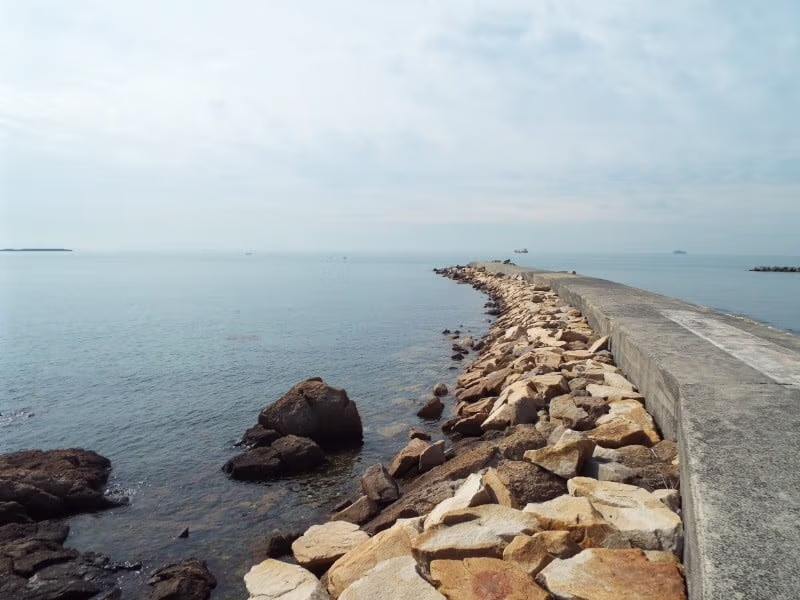
Ode To Himeji
In Himeji’s embrace, travelers find delight, A city steeped in history, an enchanting sight. Himeji Castle, towering and grand, Ancient tales whispered, as time’s grains of sand.
Kokoen Garden, a tranquil retreat, With blossoms and ponds, where nature’s rhythm beats. Otemae Street, bustling and alive, A tapestry of flavors, where tastes thrive.
Mount Shosha beckons, a spiritual climb, Engyo-ji Temple, a haven sublime. Through its gates, serenity unfolds, Whispers of wisdom, the soul gently molds.
From Himeji, venture to distant lands, Kobe’s vibrant harbor, where joy expands. Kyoto’s temples, a timeless allure, And Hiroshima’s resilience, a story pure.
In Himeji’s essence, beauty thrives, A symphony of culture that forever strives. Let its whispers of history guide your way, As you explore and create memories each day.
